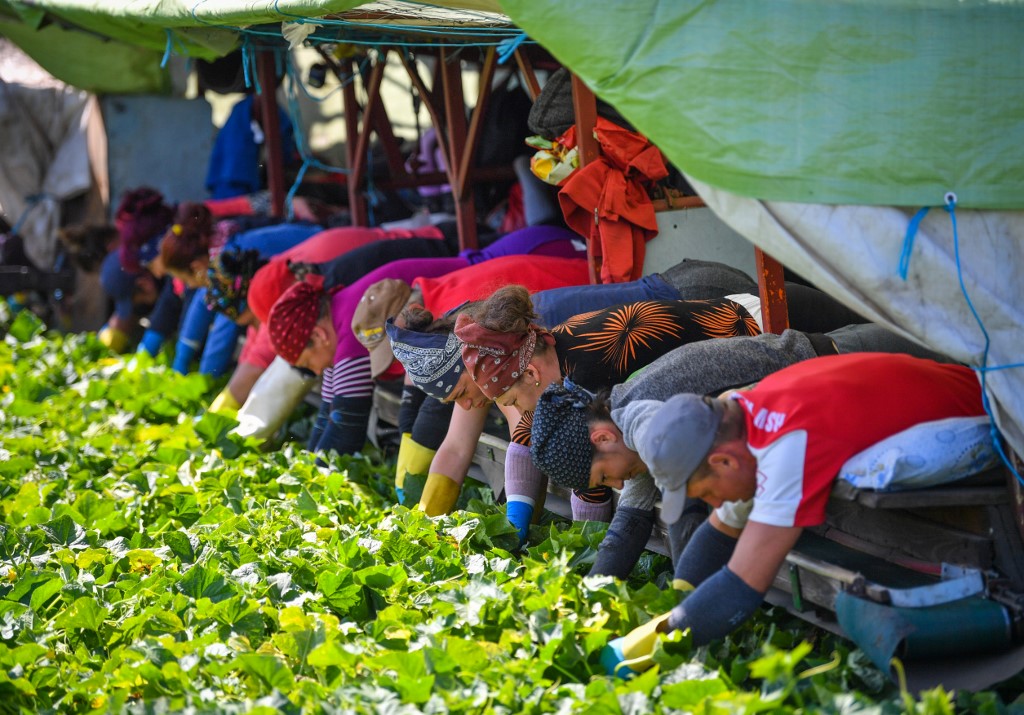
EU-agriculture relies on the superexploitation of seasonal migrant workers
Seasonal workers working in agriculture in Germany face systematically lower wages, insufficient health insurance, unsafe working conditions and high costs of accommodation, a study carried out by the NGO Oxfam found. This type of conditions are very common in the EU.
The workers often receive a wage combined of hourly wage and a wage that this paid by the tasks completed. It is common that the boss falsifies how many hours they have worked, and does not pay for the whole time. The days are long, up to ten hours, and physically draining. Seasonal workers do not have to have a health insurance like other workers – despite their work causing many health problems for them – which is why not all bosses provide their workers with sufficient insurance or make the workers pay a private insurance themselves. One of the main ways of the bosses of robbing the wage of the workers is reducing accommodation from the wages. The workers say that often this price is ridiculously high – for example, a place in a barrack without a kitchen costs 40 euros per square meter, twice as much than a rent before heating, electricity and water in the city center of Munich, which is one of the big German cities with high rent prices. This type of robbing of the wages or putting workers to debt to the bosses is an example of a type of semi-feudal exploitation. One worker describes the conditions: “This here is not Europe.”
Hundreds of thousands of workers come every year to Germany to work in agriculture seasonally. For German imperialism, especially the EU free movement of labor force is an important part in running its agricultural industry, as most of the workers come from Eastern European EU-states. 95% of the seasonal workers in agriculture in Germany are not German citizens. Similar phenomenon is seen also in other EU-imperialist countries, especially Spain and France (even though these countries are more reliant on workers from outside the EU). Agricultural work in imperialist countries is largely carried out by migrant workers of oppressed nations, and according to a study, is the branch where migrant workers are exploited in even more extreme ways than in other branches.
The evidence of semi-feudal and even slavery-like conditions is well known. One EU-study describes that most of the hundreds of thousands of agricultural migrant workers in Italy find work through the illegal caporalato system, which relies on caporali, gang-masters, who organize teams of workers, provide them with accommodation, transportation and food and reduce this from their wages. The workers live under the threat of violence, and especially women are at high risk of being sexually abused. Spain is the world’s largest exporter of strawberries. Many of the workers who work on the fields are women from Morocco, who usually do not speak Spanish, are illiterate and have been recruited in their home villages, making them completely dependent on the bosses and intermediators from their country who make “deals” with the boss. Additionally, the use of illegal workforce and unregistered work is more prevalent in agriculture and among seasonal workers than in other sections of economy in the EU – these workers lack even the bare minimum of legal protections.
Also other studies show the existence of these kinds of production relations also in imperialist countries, and that the superexploitation is increasing around the world. Some of the most extreme forms of superexploitation is slavery-like conditions. Around the world, the amount of people working in the conditions of ”modern slavery” has risen according to the Global Slavery Index made by the NGO Walk Free. In this ranking, even in the ”least affected” countries – such as Switzerland, Germany, Norway, Sweden, Finland, Japan – thousands of people are exploited under varying conditions in which they do not have the relative ”freedom” of the workers corresponding to the capitalist mode of production, from slavery-like working conditions to debt coercion to human trafficking and the sale of children, to forced and servile marriage which lacks the ”freedom of choice” of the woman even on paper.
The importance of this labor force was demonstrated during the Covid-19 pandemic, when in this case Germany ruled that the migrant workers are ”essential” and despite having quite strict rules for entering the country and forbidding people their normal every-day interactions with each other, made the decision to fly in thousands of farm workers from Eastern and Central Europe. Also at this time, labor law violations and exposure to health hazards (like the Covid-19 virus) in insufficient, shared accommodations provided by the bosses were largely covered by media, even though this situation was nothing new. Many studies over the years show that the migrant workers in agriculture work in conditions that do not exist for the ”native” workers of imperialist countries – which is why they are ”essential”.

